Тиждень англійської мови у школі (матеріали для проведення)
Посібник рекомендовано для вчителів англійської мови та учнів загальноосвітніх навчальних закладів.
У посібнику зібрано матеріали для проведення тижня англійської мови в школі.
![]()
Відділ освіти Підволочиської селищної ради
Методичний кабінет
Підволочиська ЗОШ І-ІІІ ступенів
Тиждень англійської мови
на тему:
“The most beautiful word in the English language is YOU”
Вчителя англійської мови
Підволочиської ЗОШ І-ІІІ ступенів
Лешків Оксани Володимирівни
2018 р.
Посібник рекомендовано для вчителів англійської мови та учнів загальноосвітніх навчальних закладів.
Укладено:
Лешків О.В. – вчитель англійської мови Підволочиської ЗОШ І-ІІІ ступенів.
Полещук Т.Б. – вчитель англійської мови Підволочиської ЗОШ І-ІІІ ступенів.
У посібнику зібрано матеріали для проведення тижня англійської мови в школі.
Рецензенти:
Петрунів Г.Г. - методист методичного кабінету відділу освіти Підволочиської селищної ради.
Лященко Л.П. - вчитель англійської мови Підволочиської ЗОШ І-ІІІ ступенів.
Схвалено на засіданні наукво-методичної ради методичного кабінету відділу освіти Підволочиської селищної ради.
Протокол №____ від _________2018 р.
Зміст
1.Святковий захід відкриття тижня англійської мови ………………………...….6
2.Брейн-ринг “We love English” (4 класи)…………………………………….....12
3.Квест-гра “English Express” (5 класи)…………………………………………..17
4. Відкритий позакласний захід “English Tea Drinking Traditions”……………..20
5. Брейн-ринг “English is fun”……………………………………………………...24
6.Конкурс “The best reciter” (2-4 класи)…………………………………….……..28
7.Свято англійської мови “Happy English” (1-5 класи)…………..………………30
8.Інтелектуальне шоу “Who is the best at English?” (7 класи)………...………….42
9. Сценарій вечора “The Great Unknown”, присвяченого творчості
У. Шекспіра ( 10-11 класи)………………………………………………………..48
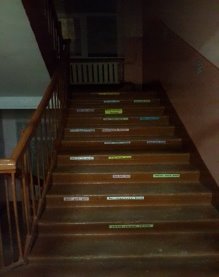
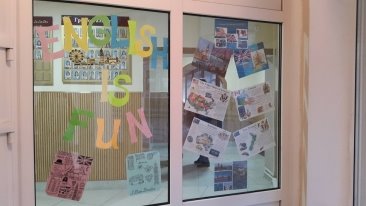
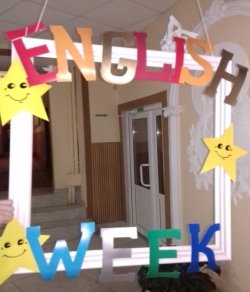
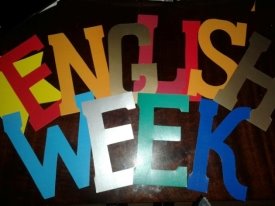
Мовленнєво-розумова діяльність – єдиний процес творення думки та мовлення – складає підґрунтя для спілкування. Оволодіння учнями основами спілкування є практичною метою вивчення іноземної мови у школі. Одним із засобів активізації мовленнєво-розумової діяльності є гра. В процесі рольової гри, ігрової ситуації, конкурсу підсилюється емоційне сприйняття матеріалу. Учні активно набувають мовленнєвих навичок. Тому у ході навчально-виховного процесу доцільно використовувати не тільки урочну форму роботи, а й практикувати проведення позакласних заходів, конкурсів, залучати учнів із різними здібностями до їх підготовки та участі. Важливу роль такі форми роботи відіграють на різних вікових етапах, починаючи від вивчення англійської мови у початковій школі і завершуючи у старшій школі.
Проведення предметних тижнів, зокрема з англійської мови, дає учням можливість розкрити власні інтелектуальні, мовленнєві та творчі здібності школярів, проявити себе у різних ситуаціях та ролях, дізнатися багато нового, зацікавитися, а можливо й визначити свою подальшу долю, дізнавшись про власні вподобання, та усвідомлено вивчати предмет.
Пропонуємо зразок плану Тижня англійської мови, а також конспекти нестандартних уроків та заходів із застосуванням інноваційних технологій, які можна проводити в рамках предметного тижня.
Тема тижня англійської мови:
“The most beautiful word in the English language is YOU”
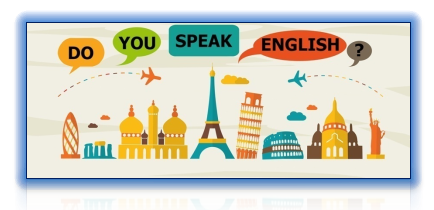
Девіз тижня:
“Speak English, so that the world will be a new world”
Понеділок
- Святковий захід відкриття тижня англійської мови
- Конкурс на кращу стінгазету
- Виставка-презентація «What we know about Great Britain»
- Брейн-ринг “We love English” (4 класи)
Святковий захід відкриття тижня англійської мови
Мета: Розповісти про сучасне значення англійської мови як світової мови та мови міжнародного спілкування; зарубіжної літератури як одного з найцікавіших і найважливіших предметів. Розвивати ерудицію та естетичні смаки учнів. Виховувати інтерес та повагу до культури.
Обладнання: презентаційний матеріал.
Хід заходу:
Прокурор. Панове присяжні! Сьогодні ми заслуховуємо скаргу. Позивачами є Фрау Дойч та пані Українська література, відповідачі — містер Інглиш та пані Зарубіжна література. Я зачитаю заяву позивачів. Вельмишановні судді та присяжні! Містер Інглиш та пані Зарубіжна література заполонили геть усі школи, безкарно насаджують скрізь свій світогляд. Під їх впливом більша частина населення вважає, що англійська мова більш популярна й потрібніша в житті, а зарубіжна література - більш цікава . Вважаю, що такий статус англійської мови та зарубіжної літератури є виявом дискримінації стосовно всіх інших шкільних предметів, їх приниженням та безпідставним забуттям. Отже, прошу притягти містера Інглиша та пані Зарубіжну літературу до відповідальності, адже подальше мирне мовне співжиття просто неможливе, більше того — небезпечне для інших шкільних дисциплін» Сподіваюся на розсудливість та мудрість суддів та присяжних.
Суддя. Протест прийнято. Фрау Дойч , що ви можете додати до обвинувачення.
Фрау Дойч
Що тут додати,
Містер Інглиш знахабнів —
Все і скрізь заполонив.
Прагне статусу такого,
Щоб пожерти інші мови.
Ще й зар літ підговорив,
Так зрадливо учинив!
Зарубіжна література,
Знайте, — це полікультура.
Будьте, містер Інглиш, певні — .
Виділятися нечемно!
Бо повстануть і поети —
Гейне та великий Ґете!
Адже всім давно відомо —
Дойч та Інглиш — рідні мови.
Тож з якого тоді дива
Дойч вивчати неважливо?
Суддя. Пані Українська література ми вас слухаємо
Я немов у вигнанні.
Мушу я сказати — ні!
Ні! — терпіти вже не стану
Я приниженого стану.
Адже всім давно відомо —
Всі разом ми у цім домі.
Тож з якого тоді дива
Зарубіжна більш важлива?
Зважте, судді, на ці факти
Й не доводьте до інфаркту
(Хапається за серце, ковтає заспокійливі пігулки.)
Суддя. Містере Інглиш, які у вас є аргументи на свій захист?
Містер Інглиш
Вельми дякую. Промови Я почув палкі про мови.
Нарікаєте на мене Ви, добродійки, даремно.
Мовам різним іноземним Я вклоняюся доземно,
Та, вважаю, маю право Мандрувати по державах,
Відкривати всюди візи І робити власний бізнес.
От розважте, чесне слово, Я присутній в кожній мові:
Таймер, плейер, ланч, хотдог, Та мені велів сам Бог
Скрізь поширюватися світом І наносити візити.
Байкер, кліп, біфштекс, коктейль, Детектив, модем, віндзейль,
Степлер, принтер, ноутбук
Інглиш — ваш найкращий друг! Він поєднує народи,
На слова заводить моду. Хай це, може, і банально —
Інглиш — мова все ж глобальна!
Суддя. Вам слово пані Зарубіжна література
З величного Олімпу я зійшла,
Розбивши щире серце Прометея.
Аврора, чиста вранішня зоря!
Антична Давньогрецька я Медея!
Вся лірика Ду Фу, лише мені.
Лише мені вірші Омар Хаяма.
І Руставелі виручить в біді,
Вдягнувши шкуру тигра полум’яну.
Лише мені Петрарківський сонет.
Шекспірівська віршована робота,
В якій увіковічнився поет.
Сервантесівський погляд Дон Кіхота…
Мацуо Басьо шле палкий привіт,
З прекрасної країни сходу сонця.
Йоган Крістоф , дарує дивний світ,
А Гофман посміхається в віконця.
Адам Міцкевич…Та багато тих,
Знання про кого дітям я доношу,
Вклоняються, щоб не забула їх,
І виконаю все, що не попросять!
Суддя. Заслухавши обидві сторони, надаю слово судовим експертам.
1-й судовий експерт. Читаючи зарубіжну літературу учень отримує естетичну насолоду, збагачує свій словниковий запас. Також зарубіжна література виховує вічні цінності у всіх школярів.
2-й судовий експерт.Англійська мова є офіційною мовою в 57 країнах світу. Це більше від будь-якої іншої мови. Якщо писати англійською всі числа словами за порядком (one, two, three….), то буква b вперше зустрінеться тільки в числі one billion. В англійській мові буква Q зустрічається лише один раз на кожні 510 слів. Словниковий запас англійської мови налічує 800 000 слів. У слові indivisibility (неподільність) буква I повторюється 6 разів.
3-й судовий експерт. Під час уроків зарубіжної літератури учні вчаться працювати із словом, відрізняти художній світ твору від реального життя, ознайомлюються з ознаками й законами художнього часопростору.
4-й судовий експерт. Рекордсменом за кількістю значень є слово set: 44 основних значення для дієслова, 17 основних значень для іменника, 7 основних значень для прикметника і ще купа всіляких додаткових значень. 4-судовий експерт В цілому Інтернеті приблизно 70% займають сторінки англійською мовою. Поки ви мене уважно слухаєте , 700 мільйонів осіб в усьому світі вивчає англійську мову. Англійську мову вважають своєю рідною мовою майже 400 мільйонів людей, а в якості другої мови нею володіють більше 1 мільярда людей.
5-й судовий експерт. В переліку шкільних предметів, є лише один, який вам абсолютно безкоштовно організує захоплюючий тур по всіх країнах світу – це зарубіжна література. Ви будете мати змогу опанувати професію маляра разом із Томом Сойєром, навички самозахисту із Гераклом та Ахіллом, станете на чолі корабля поряд із Діком Сендом, візьмете участь у лицарському турнірі пліч-о-пліч з Айвенго, пірнете з головою у справжнє кохання перечитуючи «Євгенія Онєгіна».
Суддя. Добре, добре. Я уважно вислухала всіх: і експертів і свідків і обвинувачуваних. Тож моє рішення таке:
- Провести у щколі тиждень англійської мови. Якщо вам, мої дорогі, так хочеться себе проявити, то я вам подарую цілий тиждень, для того, аби продемонструвати себе на всі 100%.
- Ознайомити всіх учнів із планом проведення тижня
Оголошення плану проведення тижня
Ведучий 1 В наш час для того, щоб мати гарну роботу, потрібно знати іноземні мови. Найпоширеніші мови в світі – китайська, іспанська, англійська й деякі інші мови. Але кожна добре освічена людина в світі говорить англійською, бо це – мова спілкування, бізнесу, науки й культури.
Ведучий 2 Англійська мова зараз найважливіша і найпоширеніша мова у світі. Це державна мова в п’яти країнах : Великобританії, Канаді, США, Австралії і Новій Зеландії. Англійська мова – одна з шести офіційних робочих мов Організації Об’єднаних Націй. Це – друга робоча мова в Європейському Співтоваристві. Англійською мовою розмовляють практично у всьому світі кожні сім чоловік з десяти.
Ведучий 3 Незалежна Україна має зв’язки з багатьма державами. Усе більше прямих контактів встановлюється з країнами Європи, Сполученими Штатами, Великобританією, Канадою та іншими англомовними країнами.
Розвиток екологічної індустрії призводить до утворення сотень спільних підприємств в багатьох містах і містечках України. Багато іноземних делегацій прибуває до нашої країни. В свою чергу наші бізнесмени, туристи, експерти часто виїжджають за кордон. Англійська – мова міжнародного спілкування, тому дуже важливо вивчати її.
Ведучий 4 Англійську мову варто вивчати. Існують відомі вислови : «Скільки мов ти знаєш, стільки разів ти людина», а також «Нова мова – новий світ».
Ведучий 5 Кожна людина, яка вирушає за кордон , повинна бути здатна знайти свій власний шлях в англомовному суспільстві без перекладачів.
Ведучий 6 Якщо ви візьмете собі за мету вивчити мову, якою творили свої шедеври Шекспір і Байрон, Діккенс і Конан Дойль, Драйзер і Хемінгуей, якою співали легендарні «Бітлз», то ви обов’язково знайдете шляхи і способи досягти своєї мети.
Ведучий 7 Увага! Увага! Гості з англомовних країн! А тепер нехай звучить англійська мова!
Great Britain. I am from Great Britain, the country of fogs and rains. Everyone in the world dreams to see Big Ben, Westminster Abbey and Tower. So, visit my country and you`ll stay here forever.
Я із Великої Британії, країни густих туманів та дощів. Кожна людина на Землі мріє побачити Біг Бен, Вестмінстерське Абатство і Тауер. Тож відвідайте країну і ви залишитесь тут назавжди.
The USA.Let me introduce myself. I`m from the USA, one of the richest country in the world. We, Americans, are proud of Statue of Liberty, Disneyland and Hollywood, the heart of movie production. So, learn English and visit America.
Дозвольте представитись. Я із США, однієї з найбагатших країни світу. Ми, американці, пишаємося Статуєю Свободи, Діснейлендом та Голівудом, колискою кінематографу. Тож вчіть англійську мову та завітайте до Америки.
Canada. Hello! I am from Canada. It is the country of lakes. Niagara Falls is the best known natural wonder. Canadians love water kinds of sport. If you want to go in for sport, you are welcome to Canada.
Привіт! Я живу в Канаді. Це країна озер. Ніагарський водоспад – найвідоміше диво природи. Жителі Канади люблять водні види спорту. Тож якщо ви хочете ними займатися, ласкаво просимо до Канади.
Australia. I am from Australia. Sometimes it is called Kangarooland or the Lucky Country. Kangaroo is a symbol of Australia. It is interesting that there are animals and plants here which you will find nowhere else. So, if you want to see them, visit my country.
Я із Австралії. Інколи її називають землею кенгуру або Щасливою країною. Кенгуру – це символ Австралії. Цікаво, що тут є такі тварини і рослини, яких не знайти ніде. Якщо ви хочете їх побачити, приїжджайте в нашу країну.
Scotland. I am from Scotland.It is the country of mountains. Scotland is famous for its Edinburg International Festival and national costume – kilt and musical instrument bagpipe. So, meet in Scotland.
Я – із Шотландії. Це – країна гір. Шотландія відома своїм міжнародним фестивалем в Едінбурзі і музичним інструментом – волинкою. Кілт – їх націльний костюм.Тож зустрінемось у Шотландії.
Ireland.I am from Ireland. Our land is covered with fresh green grass that makes the island so beautiful.The shamrock is the national symbol of Northern Ireland. The shamrock is connected with St. Patrick, Patron Saint of Ireland’s . We are waiting for you in Ireland.
Я із Ірландії. Наша земля завжди вкрита свіжою зеленою травою. Це робить острів дивовижним. Конюшина – це символ Північної Ірландії. Саме конюшина пов’язана із ім’ям Святого Патріка, покровитея Ірландії. Тож чекаємов вас в Ірландії.
Learn English and welcome to the English-speaking countries. 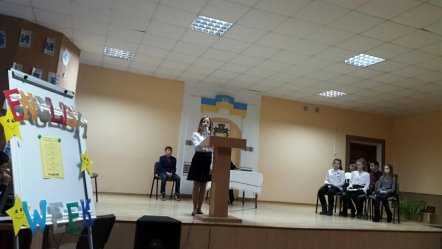
Конкурс на кращу стінгазету
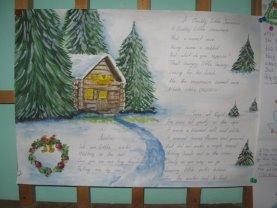
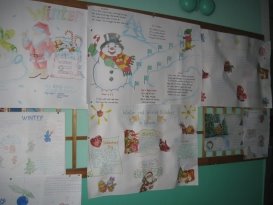
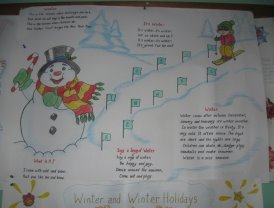
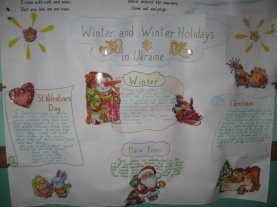
Брейн-ринг “We love English”
Цілі: підвищувати мотивацію щодо вивчення англійської мови;
розвивати та вдосконалювати лексичні та граматичні навички учнів, навички говоріння, аудіювання, правопису;
розвивати пізнавальний інтерес до предмету,виховувати командний дух та почуття співдружності
Обладнання: картки із завданнями, малюнки, набір предметів для конкурсів, звукозапис пісні The ABC
План заходу
1. Оргмомент, вітання учасників, пояснення правил змагань.
2. Перший раунд: ігри з літерами
- «Назви слова по літерах»
- «Прийом-відправлення телеграм».
3. Другий раунд: лексичні ігри
- «Що намальовано»
- «Склади максимум речень»
- «Кросворд»
4. Третій раунд : ігри на розвиток пам'яті
- «Снігова куля»
- «Я бачив»
5. Четвертий раунд: словотворення. «Утвори слова».
6. П’ятий раунд: ігри на розвиток навичок аудіювання
- «Саймон каже»
- «Несправний телефон».
7. Підбиття підсумків
Хід заходу
1. Оргмомент, вітання учасників, пояснення правил змагань.
Good morning, dear friends! You are welcome to take part in the game "Brain ring". I think two teams will show their best and the fans will support their favourite teams. Please, listen attentively to the rules and conditions of each game, be active, quick and “Good luck”.
2. Перший раунд: ігри з літерами. Letter games.
Let's review the alphabet. Do you remember all letters? Let’s sing a song about the ABC. (Виконання пісні). Could you show some of letters?
- «Назви слова по літерах».Spell the word.
Can you spell words? It's very important in Great Britain. Your task is to write three words on the cards so that the other team could spell them.
I team : sausage, flour, pie
II team : school, badge, pack
III team : dinosaur, bar, desk
b) «Прийом-відправлення телеграм».Sending-receiving telegrams.
To send a telegram an operator has to spell the words of it. Would you like to try to be the operators of the telegraph company? One team spells the telegram the other receives it. Then you do vice versa.
Texts:
I team: I like books and dogs.
II team: I can read and write.
III team : I play computer games.
3. Другий раунд: лексичні ігри
You can cope well with letters. What about words? Let's play some lexical games.
- «Писемні перегони». Spelling race
Представники обох команд (по1 учню ) шикуються біля лінії старту. Кожна команда отримує листочки для написання на них слів. Вчитель називає слово, яке учні повинні написати на своїх листках. Якщо команда написала слово правильно то її учасник робить крок вперед.
Potato, onion, school, boy, children, desk, pencil, exercise-book, cabbage, pirate.
- «Склади максимум речень» Make up sentences.
You received the cards with words. Your task is to make maximum sentences with them.
Words:
I team: tomato, room, granny
II team: dog, sister, book;
III team : pencil, school, computer
4. Третій раунд : ігри на розвиток пам'яті
You know how to work with words, but it isn't enough to learn good English. You need a good memory. Do you have it? Let's check up.
- «Снігова куля» Snowballs.
Say, what your friend does and add your own variant.
E.g.. Nina likes winter, Vasia likes spring, I like summer.
Questions:
I team : — what do you do at home?
II team: — what animals do you like?
III team : — what colours do you like?
b) «Я бачив». I saw.
Look, there are 10 objects on the table. You watch at them for 1 minute, and then you say what you saw.
(Objects: pen, pencil, pencil-box, clock, bag, apple, book, doll, ball, copy-book.)
5. Четвертий раунд: словотворення. «Утвори слова». Word making.
Your next task will be the following. You have to form words using the letters:
a, p, p, l, e – apple; d, o, g – dog.
I team: p, o, t, a, t, o; c, a, t
II team: j, u, i, c, e; f, o, x
III team :a, p, p, l, e; d, o, g
6. П’ятий раунд: ігри на розвиток навичок аудіювання
Are you attentive listeners? It's very important for learning English. We'll
check it up in a few minutes
- «Саймон каже». Simon says.
You show only what Simon says.
I team:
- Sit still,
- stand up,
- clap your hands,
- take a book,
- sleep,
II team:
- Touch your nose,
- clap your hands,
- show me a window,
- stand up,
- show me a pen,
- sit still,
- sleep,
- go to the door.
III team :
1. touch your head,
2. touch your knees
- sit still,
- sleep,
- go to the door.
- «Несправний телефон». The last game today is "Bad telephone".
Transmit the sentence by whisper. The last pupil says it aloud.
I team: Mom cooks the apple pie.
II team: I have got a jar of jam.
III team: I usually get up at 7 o’clock.
- A magic square
Choose the number from 1 to 9.
-
Say or sing the English alphabet.
2. Name 5 colours.
3. Name 5 parts of body.
4. Name 5 school subjects.
5. Name 5 English names.
6. Name 5 sorts of vegetables and fruits.
7. Name 5 school things.
8. Name 5 professions.
9. Name 5 months.
10. Our next contest is called «Find the mistake»
1. I have 5 book. ( books)
2. They is sisters. ( are)
3. What is your names? ( name)
4. I see one dogs ( dog)
11. Summary.
So we have a winner team today. And it is the …. form.
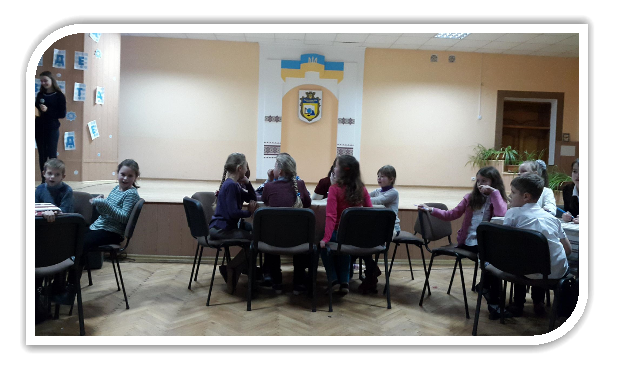
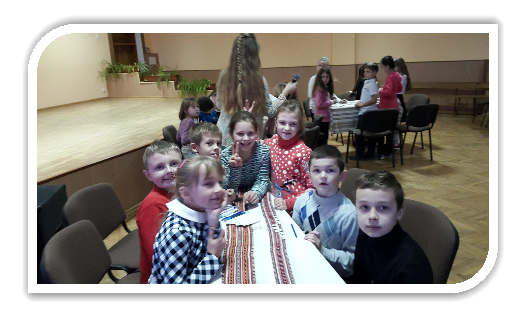
Вівторок
- Виставка «Англійська мова в повсякденному житті» (“English around us”) (2-4 класи )
- Конкурс розмальовок “English is fun” (1-4 класи)
- Квест-гра “English Express” (5 класи)
Виставка «Англійська мова в повсякденному житті» (“English around us”) (2-4 класи )
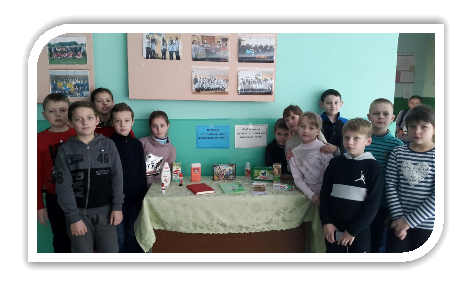
Конкурс розмальовок “English is fun” (1-4 класи)
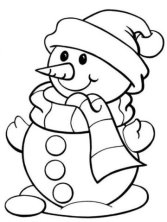
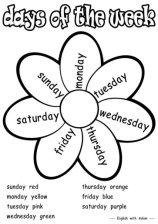
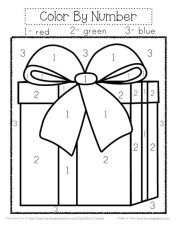
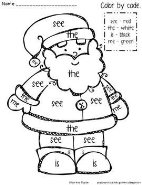
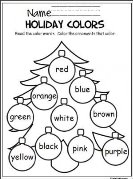
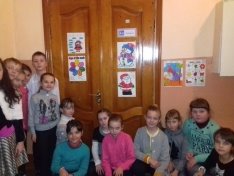
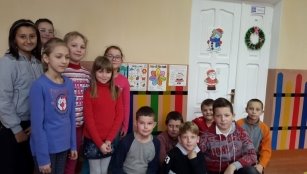
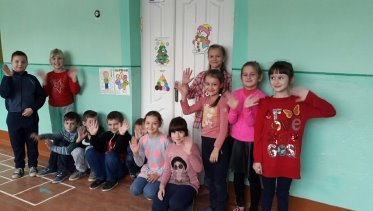
«English Express»
![]()
У «Англійському експресі» беруть участь учні 5 класів. Учні після команди ведучого беруться один за одного, утворюючи так званий «експрес» та, не розриваючи ланцюжок, рухаються за даним їм маршрутом. На кожній станції вони виконують відповідні завдання та керуючий станцією вносить набраний ними бал до їхнього маршрутного листа. Найвищий бал на кожній станції – 5 балів.
Назви станцій та їхнє місцезнаходження
|
Кабінет англійської мови - Guess the Word! Комп’ютерний кабінет- Can You Use a Computer? Кабінет біології – Name the Words Using the Cards! Кабінет світової літератури- Recite a Poem! Кабінет математики – Count and Do Sums! Кабінет музики – Sing a Song! Кабінет української мови – Translate into Ukrainian! |
Guess the Word!
На цій станції учні кожної команди повинні відгадати 5 англійських слів, для цього їм слід поставити букви у кожному слові у правильному порядку, а коли слова знайдені, їх слід перекласти на українську мову
|
w |
d |
n |
i |
Wind-вітер
|
s |
w |
n |
o |
Snow- сніг
|
w |
e |
r |
n |
i |
t |
Winter-зима
|
r |
t |
t |
a |
i |
s |
Artist- художник
|
w |
i |
t |
r |
r |
e |
Writer- письменник
|
s |
i |
n |
g |
r |
p |
Can You Use a Computer?
Діти показують свої вміння працювати з комп’ютером. Вони виконують завдання сайту “Learning Chocolate”.
“Hobbies 1” (p.2, Match 3)
Name the Words Using the Cards!
Для кожного класу підібрані картки за відповідною темою (по 10 штук). Учні повинні назвати англійською мовою, що зображено на картках
“Fruit and Vegetables” (It is a (an)… .)
Recite a Poem!
Учні повинні всі хором продекламувати один з вивчених віршів.
Count and Do Sums!
Учні повинні виконати математичні завдання.
Виконати дії:
55+15= 62-12= 15+25= 48-24= 35+14=
Sing a Song!
Учні повинні всі хором проспівати одну з вивчених пісень.
Translate into Ukrainian!
Учням кожного класу слід перекласти по п’ять речень на українську мову.
Autumn is a beautiful season. / Осінь – красива пора року.
The birds sing their songs. / Пташки співають свої пісні.
A year has got four seasons. / Рік має чотири пори року.
An artist paints pictures. / Художник малює картини.
March, April and May are spring months. /Березень, квітень, травень – весняні місяці.
Коли команди закінчують свій маршрут, вони повинні здати свій маршрутний лист вчителю англійської мови. Вчитель підраховує бали та визначає переможців.
Середа
- Проектна робота “The map of Great Britain” (8 класи)
- Гра “The smartest person” (10-11 класи)
- Tea party and movie (7-9 класи)
- Брейн-ринг “ English is fun” ( 6 класи)
Проектна робота “The map of Great Britain” (8 класи)
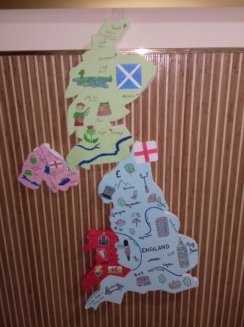
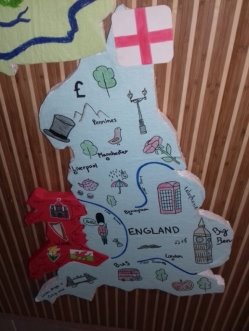
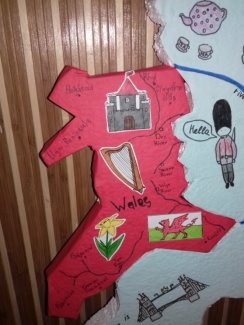
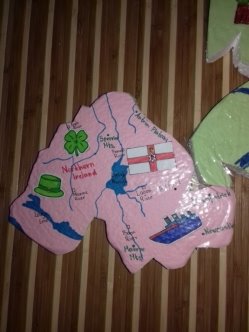
Відкритий позакласний захід
з англійської мови
“English Tea Drinking Traditions”
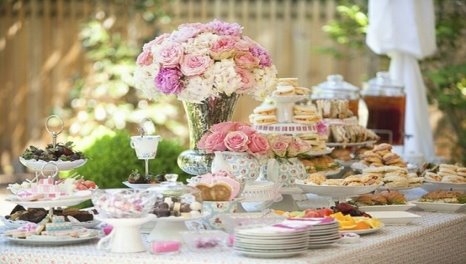
Мета:
Освітня:
- розширювати соціокультурні знання учнів через знайомство з особливостями вживання чаю в Англії;
- познайомити з чайним етикетом;
- сприяти зміцненню знань про традиції та звичаї країни, мова якої вивчається.
Розвиваюча:
- розвивати творчі та мовленнєві здібності учнів;
- сприяти розвитку навичок роботи в групі.
Виховна:
- виховувати поважне ставлення до способу життя інших народів;
- виховувати позитивне ставлення до англійської мови.
Обладнання: два сервірованих столи, мультимедійний проектор.
Вступне слово вчителя:
Good afternoon. I am glad to see everybody.
We are living in a quickly changing world with numerous problems now, people often feel left and lonely. But it shouldn’t be so. There should be such a place, where a person can feel comfortable, cozy and such comfort is usually established with the help of family, its customs and traditions. There is a “five-o-clock” tea tradition in England. I hope it will be interesting for you to learn some facts about it. (слайд 1)
1-й ведучий: Traditional tea time in England is late afternoon, when world-famous 5 o’clock tea is served. Five o’clock tea is a ceremony, a work of art. It is not only about a perfect combination of the tablecloth, the napkins, the flowers, the vases and the tea set; it means a certain way of behaving and talking too. But tea is also drunk in the morning and during the day because the English believe it to be healthy and refreshing. (слайд 2)
2-й ведучий: Tea is one of the most popular drinks in the world. By the way, do you like it?
(Відповіді учнів та гостей)
For centuries people believed that tea could cure illnesses, they used it as medicine. Today scientists know that tea contains chemicals that prevent cells from dying.
I am sure it will be interesting for you to know when the British started drinking tea.
(Виходять хлопець та дівчина у костюмах ХVII сторіччя)
Хлопець: Despite the fact that tea drinking is considered English, the British were actually one of the last countries in Europe to try tea.
Дівчина: Tea first arrived in Britain in 1662 when King Charles II married the Portuguese princess, Catherine of Braganza. Catherine brought tea chests to England as part of her wedding dowry and soon popularized the custom of taking tea at court. (слайд 3)
Хлопець: And many years later tea drinking became still more popular, once again, thanks to the Royal Family. Afternoon tea was introduced in England by Anna, the seventh Duchess of Bedford, in the year 1840. (слайд 4)
Дівчина: She is said to have complained of “having that sinking feeling” during the late afternoon. At the time it was usual for people to take only main meals a day, breakfast, and dinner at around 8 o’clock in the evening. The solution for the Duchess was a pot of tea and a light snack, taken privately in her boudoir during the afternoon.
Хлопець: Later friends were invited to join her in her rooms and this practice proved so popular that the Duchess continued it, sending cards to her friends asking them to join her for “tea and a walking the fields”. Other social hostess quickly picked up on the idea.
(Виходять дві дівчини у ролі домогосподарок 60-х років та сідають біля маленького столика)
Перша домогосподарка: Afternoon tea, because it was usually taken in the late afternoon, is also called “low tea” because it was usually taken in a sitting room or withdrawing room where low tables were placed near sofas or chairs. (слайд 5)
Друга домогосподарка: There are three basic types of Afternoon , or Low tea; differing by the foods served. Aside from tea,
Cream Tea offers fresh baked scones, jam and cream.
Light Tea features tea, scones and sweets.
Full Tea offers tea, savories (tiny sandwiches), scones, sweets and dessert.
(слайд 6)
Перша домогосподарка: In England, the traditional time for tea was four o’clock and no one stayed after seven o’clock. Most tea rooms today serve tea from three to five o’clock.
Друга домогосподарка: The menu has also changed from tea, bread, butter and cakes, to include three particular courses served specifically in this order:
savories – tiny sandwiches or appetizers,
scones – scones served with jam or cream,
pastries – cakes, cookies, shortbread and sweets.
3-й ведучий: It’s high time to find out how to make perfect English tea.
(учень підходить до сервірованого столу)
Make sure you have all the necessary items: napkins, a tea pot, cups, saucers, dessert plates, a jug with milk, a tea strainer with a saucer for it, a sugar bowl, a small vase with flowers and a serving tray with at least two levels on which to display the sweet and savory snacks.
(учень демонструє процес заварювання чаю)
- Select a good quality brand tea.
- Boil the water.
- Warm the teapot with hot water first (fill it, and then drunk it out).
- Add one teaspoon for tea per cup plus one extra teaspoon for the pot.
- Pour boiling water and stir briefly. It is essential that the water is boiling, in order to release all the flavor of the tea.
- Wait! The tea needs time to develop its flavor, 3 or 5 minutes.
- Place the tea strainer over the top of the cup and pour the tea in.
- Add milk and sugar to taste.
- Enjoy your tea!
(Слайди 7-13)
4-й ведучий: Do you like to drink tea with lemon or milk?
(Відповіді учнів та гостей)
Let’s talk about the habit of putting milk in tea.
5-й ведучий: Tea is traditionally served with lemon or milk. It used to be drunk black without anything in it, but as people became more in a hurry they added milk to drink more quickly. It is possible that milk was used to cool the tea down when the hostess did not want to have her guests for too long.
4-й ведучий: Another explanation of milk in tea is the fear to break the delicate porcelain that teacups were made of. Real porcelain does not normally break but early examples of British porcelain cups sometimes fell apart. It was safer to put some milk first to reduce the temperature of the tea so the cups did not break.
5-й ведучий: Besides, milk helps to determine the quality of tea. The perfect cup of tea will have a dark orange-brown look once the milk has been added
(Виходять четверо учнів. Двоє учнів розповідають правила етикету, а двоє інших сідають за стіл та демонструють ці правила)
Дівчина: Just like the royalty and upper class did in the original tea parties, it is important to use proper etiquette. Here are a few party etiquette tips to remember.
Хлопець: The host or hostess can share the job of pouring the tea with close friends, but he or she should always pour the first cup.
Дівчина: If you like to have milk in you tea, add it to the teacup before the tea is poured. Also, do not use lemon in your tea if you are also using milk to avoid curdling of the milk.
Хлопець: Don’t take the sugar cubes with your fingers. Use the special sugar tongs.
Дівчина: Hold the handle of the teacup using your thumb and your first one or two fingers. There is no need to stick out your pinky. Never wrap your hand around the cup or set the cup in the palm of your hand.
Хлопець: A spoon may be used to stir your tea and it should be done quietly without clinking the teacup. After you have stirred, place your spoon on the right side of the saucer.
Дівчина: Take small, quite sips of your tea. Do not blow on the tea if it is too hot.
Хлопець: When you are not drinking tea, place the cup on the saucer.
Дівчина: Good form dictates that the plate should be raised with the left hand, while the teacup should be held with the right hand.
Хлопець: Don’t leave the slice of lemon in the cup as you sip your tea. It should be removed beforehand.
Дівчина: It is fine to eat most of the foods with your fingers, taking small bites; however, use a fork when trying to eat messy foods.
Хлопець: Food placed on a tired stand is to be eaten in a certain order, from top to bottom.
Дівчина: And one more: during drinking tea Englishmen speak only about pleasant things.
(Учні, які сидять за столом, починають свій діалог)
- The weather is great, isn’t it?
- Yes. It’s absolutely beautiful today.
- I wish it was like this more frequently.
- Me too.
- So what are you going to do this Saturday?
- I’m going to meet a friend of mine at the department store.
- Going to do a little shopping?
- Yes, I have to buy some presents for my parents.
- What’s the occasion?
- It’s their anniversary.
- That’s great. Do you need any help?
- Sure. Good idea!
Заключне слово вчителя: To sum up, I’m sure such long lasting traditions unite people, make their life bright, happy and positive. People can overcome their difficulties easily. They join different generations together. In short, the more good traditions people have the more friendly they can be.
And now we invite everybody to Tea drinking. You are welcome!
Брейн-ринг “ English is fun”
- Вступне слово вчителя
Teacher. Good morning, my dear friends. I am glad to see you here today. I know that all of you are very hardworking, smart and clever pupils, who are fond of English. Today we shall have an interesting quiz and see who is the best at English.
Today … are the members of our jury. They will count all you points and announce the winner.
Your homework was to choose the name of your team, make a slogan and choose a captain of your team. So present ,please, your teams.
Teacher. The teams are formed and we can start our quiz. At the end of it our jury will count all your points and announce the team that has won.
- Основна частина заходу
1. Our first competition is called “Young poets”. Each team will get a card with a poem “My favouritecolour”, the lines of which are not finished. Your task is to find the rhymes.
My favouritecolour is _____________(white),
My favourite number is ____________(five),
My favourite toy are the _____________(doll),
The plane, the long train and the _________(ball).
My favouritecolour is __________(red),
My favourite toy is my ______________(Ted),
Toy-animals are small and ____________(big),
Green, yellow and brown, and __________(pink).
For every correct word – 1 point. Max- 8 points
( Жюрі оголошує результати)
2. The next competition is called “My favourite letter”. I shall give you letter [ S ] and your task will be to write as many words, which begin with this letter, as you know.(3 min)
For every word you get 1 point.
3. Our next competition is called “A false letter”. Your task is to change one letter and then you will see a familiar word.(2 min)
e.g.Lat – Cat
larty – party invetation - invitation
glui – glue batge - badge
skring – string invelope - envelope
dalloon – balloon buest–guest
pactime - pastime mift - gift
treme - theme rarely - rarely
For every word you get 1 point. (max 8)
( Жюрі оголошує результати)
4. Captain’s competition. At the back of the board there is one long word. A sentence is hidden there. You must divide this long word into another word to read a sentence. The team, whose captain copes with the task the first, will get 2 points.
SheisgoodatComputerStudiesbutsheisbadatmakinginvitations.
The doctor examined my throat, listened to my heart and lungs and felt my pulse.
( Жюрі оголошує результати)
5. And now we come to the next contest which is called “A magic 5”. Look atthe square, each team will take turns in answering questions. You'll choose any number. “ ...”, it's your turn to start. Captains will have an opportunity to choose the number.
You can get 5 points for the right answer.
|
1 |
2 |
3 |
4 |
|
5 |
6 |
7 |
8 |
|
9 |
10 |
11 |
12 |
1. Say or sing the English alphabet.
2. Name 5 colours.
3. Name 5 sorts of vegetables.
4. Name 5 school subjects.
5. You're lucky! You won a prize!
6. Name 5 sorts of fruit.
7. Name 5 sports.
8. Name 5 professions.
9. Name 5 things that people wear.
10. Name 5 English names.
11. Name 5 English-speaking countries.
12. Name 5 wildanimals.
6. Attention, please! The next contest is called “Hidden words”. This round isfor the captains. Find, please, the animals hiding in the following sentences!
Example: If I shout, he'll hear me.(Fish)
I.
1. Close the door at once! (Rat)
2. He'll come to America tomorrow. (Cat)
II.
1. Do good workers succeed? (Dog)
2. If Roger comes, we'll begin. (Frog)
7. The task for each team is to show the story they get to another team in miming. Another team has to guess what they show.
Task 1
You have a strong toothache andyou go to the dentist to ask for help.
Task 2
You have come to a shop and you are buying some bread.
8. Конкурс «Відгадай загадку»
T: Our last round is called “Guess Riddles”
1 It can not talk but it can bark (a dog)
2 It can live without water for a long time (a camel)
3 I’m coloured, I’m bright I can walk run and fly. I cannot swim but I can sing usually in the morning (a cock)
4 What animals has long hair round it’s neck (a lion)
5 It is a domestic animals and it likes fish (cat)
6 It is a wild animals and it likes bananas (a monkey)
7 This animal likes grass. It is a domestic animals, it gives milk (a cow)
8 This animal lives at home or in the street, it is a man’s great friend (a dog)
9. And now we come to the last contest of the game called “The ABC game”.
Kids, you'll get some letters from the English alphabet. You must put the letters in the
right order, so as to get the name of the English-speaking country. You have 1 minute at
your disposal. Each team can get 5 points.
(Картки з буквами: 1. Е, N, G, L, A, N, D. 2. A, M, E, R, I, C, A).
III. Заключнийетап. Підведення підсумків гри.
T: Friends, do you like music? Listen to the song “Do You Live in London?”' now and sing with British children. Our jury will add up the score of the game.
Jury: The score is ... to ... in smb'sfavour. The team “...” is the winner.
(Переможцям гриставляться в журнал відмінні оцінки).
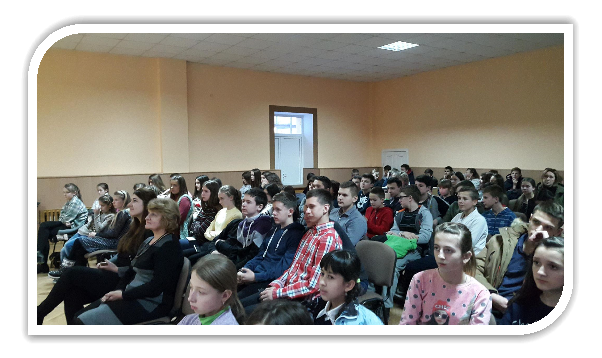
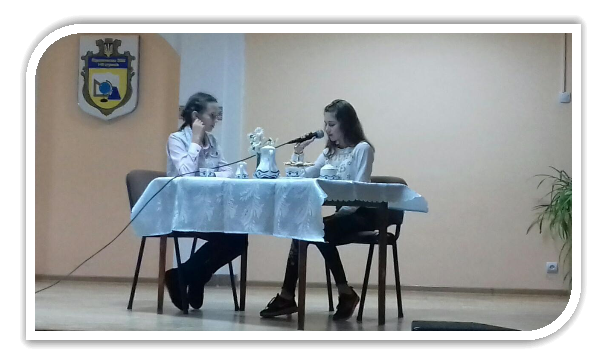
Четвер
- Конкурс «The best reciter» (2-4 класи)
- Перегляд мультфільму ( 1-4 класи)
- Свято англійської мови «Happy English» (1-5 класи)
Poems
Autumn Comes
I see the birds are flying south
And the days are grey and cool.
Do the birds look down and see
That I am going to school?
Little Girl
Little girl, little girl,
Where have you been?
I've been to see grandmother
Over the green.
What did she give you?
Milk in a can.
What did you say for it?
Thank you, Grandam.
Traveller
Pussy-cat, pussy-cat,
Where have you been?
I've been to London
To look at the Queen.
Pussy-cat, pussy-cat,
What did you there?
I frightened a little mouse
Under her chair.
Days in the Month
Thirty days has September,
April, June and November;
February has twenty-eight alone.
All the rest have thirty-one,
But leap year coming once in four
Gives February one day more.
Spring
Spring is green.
Summer is brigth,
Autumn is yellow,
Winter is white.
Good night
Good night mother,
Good night father,
Kiss your little son.
Good night sister,
Good night brother,
Good night everyone.
Snowflakes
Snowflakes, snowflakes falling down,
On the trees and on the ground.
I will build a man of snow,
Tall black hat and eyes of coal.
If the sun comes out today,
I will watch you melt away!
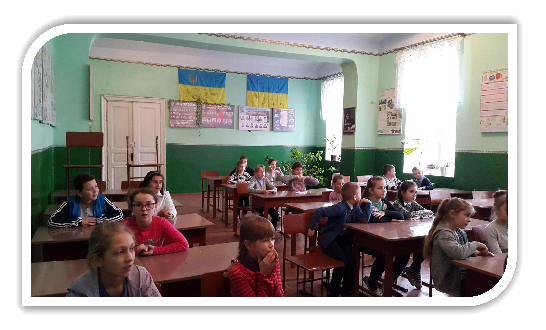
Свято англійської мови
для 1-4 класів
“Happy English”

Мета:
розвиток навичок монологічного та діалогічного мовлення, логічного будування висловлювання на англійській мові; розвивати творчу фантазію, пізнавальний інтерес, ініціативу в здійсненні мовленевої діяльності; розвивати міжпредметний зв’язок; виховувати почуття прекрасного, повагу до культури та традицій інших народів, розвивати вміння соціального спілкування, розвивати в учнів увагу і швидкість мовленнєвої реакції.
Обладнання:
1. Аудіозапис пісні “We wish you a merry Christmas”
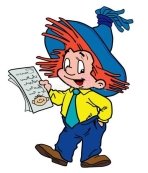 2. Аудіозапис пісні “Jingle bells”
2. Аудіозапис пісні “Jingle bells”
Дійові особи:
Незнайко
Мова
Учні
Дівчатка
Хід свята:
Незнайко.(виходить на сцену) Hello! Це поки що все що я запам’ятав англійською. Діти, я вам співчуваю… Ось у мене зараз буде урок англійської, а навчає мене не абихто , а сама пані English – Англійська мова. Хоч я вважаю, що і так знаю англійську достатньо добре.
Мова. То хто це тут знає англійську «достатньо добре» ?
Незнайко. Ну , я! А що? How do you do? Where do you live? Kyiv is a capital of UKRAIN. Bland a med. Head&Shoulders… Та я стільки слів знаю!
Мова. Ну, тоді розпочнімо наш урок прямо зараз. What is your nameе?
Незнайко. Це я знаю! Хто таке не знає?! My name is Neznayko.
Мова. How do you do?
Незнайко. ??? А можна повільніше? Бо це ж ви таке питаєте-як в інституті… Що це ви таке спитали?
Мова. Як справи?
Незнайко. Ось! Бачите, діти! Я ж казав що англійська – це якась неправильна мова! How-do-you-do. Це ж скільки слів… Аж чотири… А спитали всього-на-всього «Як справи?» Це ж слів удвічі більше. Що ж виходить – може й голова у мене стане удвічі більша, коли я вивчу всю цю англійську? Вибачайте, але я вважаю, що мій словниковий «напас» достатньо глибокий і мене вже можна зарахувати до досить просвічених людей. А англійська… Хіба це так важливо?
Мова. По-перше, словниковий запас , а не напас і ти хочеш стати освіченим , а не «просвіченим», а по-друге, англійська – це важливо і про це знають вісі діти.(виходять учні початкових класів)
Учень 1. Англійська мова поширилася по всьому світу, починаючи з 17 століття, і залишається основною міжнародною мовою спілкування, торгівлі і техніки. Англійська належить до тих мов, що має найширший словниковий запас: Оксфордський Словник Англійської мови нараховує близько 600 000 слів.
Учень 2. Також це мова, яку знають найбільше людей як другу (нерідну) : приблизно 350'000'000 людей.
Учень 3. Англійською друкують найбільше.
Учень 4. Якщо хочеш подорожувати і відвідати різні куточки нашої планети – без англійської не обійтися!
Незнайко. Як можна вивчити всі ці дивні слова! Я, щойно почую Good morning!, то мені так і хочеться кудись втекти… Англійська - це ж так нудно!!! (починає плакати)
Учень 1. Незнайку , не плач, дорогенький!
Незнайко. Як же мені не плакати? Сльози самі ллються і ллються…
Учень 2. Ми дуже хочемо тебе розвеселити! Давай ми сьогодні влаштуємо свято. Справжнє свято англійської мови і ти побачиш , що це може бути весело і цікаво.
(учні 2-3 класу декламують вірші)
Незнайко. Ой, які ж ви молодці! А я теж знаю дещо англійською… Наприклад, я можу назвати всіх тварин та звірят! Ну, майже всіх…
Мова. А чи знаєш ти алфавіт? А от наші діти знають!!!
Конкурс на складання алфавіту (4 учні).
Незнайко. Thank you very much, дорогенькі мої.
Мова. О, я бачу що твої сльози вже висохли, Незнайку. А ти любиш свята?
Незнайко. Авжеж! А хто ж їх не любить?
Мова. А яке твоє улюблене?
Незнайко. День народження! Я думаю, що всі діти люблять свій день народження!
Мова. А чи знаєш ти без якої пісні не обходиться жодне свято?
Незнайко. А я знаю, а я знаю. Ну ж бо, давайте заспіваємо всі разом!
Happy birthday to you,
Happy birthday to you,
Happy birthday Neznayka,
Happy birthday to you!
Шкода , що сьогодні не мій день народження, а то я так люблю подарунки…
Мова. Ти можеш їх заробити, якщо візьмеш участь у конкурсі «Хто більше?»
Незнайко. Хто більше пострибає на одній нозі? Хто більше зловить котів? Хто більше з’їсть цукерок?
Мова. Ні. Конкурс – хто більше знає віршів англійською мовою.
Незнайко. А призи будуть?
Конкурс «Poems»
Незнайко. Шкода, що знаю так мало …
Мова. Не сумуй. Бо діти приготували для тебе багато цікавого і веселого.
Мова. А тепер, діти, спробуйте відгадати загадки. Хто знає – піднімає руку, не викрикує:
1. I am an animal. I am big and long. I am green. I can swim. (crocodile)
2. I am an animal. I am big and angry. I am orange and black. (tiger)
3. I am a toy. I can fly. (kite)
4. I am a toy. Boys like to play with me. (car/train/plane)
5. I am an animal. I am big and brown. I like to sleep. (bear)
6. I am an animal. I am green. I can swim. I can jump. (frog)
7. I am an animal. I am grey and very little. (mouse)
8. I am an animal. I am grey and big. (elephant)
9. I live in an ocean. I am little. I can swim. (fish)
Незнайко. А знаєш, скоро і я отримаю «море» подарунків.
Мова. У тебе буде день народження?
Незнайко. Ні. Ми будемо святкувати моє улюблене свято – Різдво.
Мова. О, англійці дуже люблять це свято. У всьому світі люди святкують по-різному і цікаво.
Учень 1. 1-24 грудня – підготовка до Різдва (Advent )
Це тижні підготовки до Різдва. Одна з головних традицій цих тижнів - це вінки зі свічками, які мають особливе значення. Такі вінки роблять у першу неділю цього періоду, і звичайно вони складаються із 5 свічок: чотирьох червоних і однієї білої. Кожну неділю запалюється нова червона свічка.
Учень 2. Вони запалюються у той час, коли сім'я збирається разом за молитвою, святковим столом і т.д. Білу свічку запалюють у вечір перед Різдвом як символ того, що у світ прийде Христос і освітить пітьму.
Учень 3. 24-25 грудня – Різдво (Christmas)
Звичай вішати шкарпетки для подарунків прийшов із Англії. Санта Клаус одного разу упустив кілька золотих монет, коли спускався вниз по димарю. Монети б провалилися у пічку і пропали , якби не потрапили у шкарпетку, яку була повішено для просушування.
Учень 4. Відтоді діти вішають шкарпетки на камін у надії знайти їх повними подарунків. Вони пишуть листи з описом їхніх бажань, але замість того, щоб відправляти їх поштою, кидають у вогонь. А Санта Клаус старанно читає дим.
Учень 5. Різдвяну ялину стали прикрашати на Різдво близько тисячі років тому у Німеччини. Це , хоч і споконвічно німецький звичай, став дуже популярним , коли принц Альберт наказав принести і прикрасити ялинку у Віндзорському замку для його дружини Вікторії та їхніх дітей. Ялинки прикрашали свічками доти, поки не винайшли електричні гірлянди.
Учень 6. Теперішній Санта Клаус — це веселий дідусь з білою бородою та в тулупі з червоним капелюхом. Він літає по повітрі на казкових оленях та влазить через димарі до будинків, щоб дарувати дітям і дорослим подарунки. Образом Санти послужив рекламний персонаж компанії Кока-Кола, який так сподобався дітям своїм виглядом, що став основою для створення всесвітньовідомого Санта Клауса.
Учень 7. Англійці вітають один одного з Різдвом не лише вітальними листівками, а й співають різдвяні пісні - колядки (Carrols).
Song “We wish you a merry Christmas”
Мова. А тепер пограємо у гру “Їстівне-неїстівне.” Я називаю слова, а ви плескаєте у долоні, коли почуєте назву їстівного.
A pen, a dog, a boy, an apple, a desk, a cat, milk, honey, a ruler, a cake, a monkey,
a pear, a door, a panda, an egg, a leg, an orange, a doll, a ball, jam, ice-cream, a bag.
Мова. А яке наступне свято?
Незнайко. Ще одне моє улюблене свято – Новий Рік!
Мова. А чи знаєш ти, як святкують Новий рік у різних країнах?
Незнайко. А як? Розкажіііть, будь-ласка!
Учень 1. При всьому розмаїтті, новорічні свята в різних країнах мають спільні риси: це прощання зі старим роком, сподівання, що неприємності залишаться в минулому, а в новому році все зміниться на краще. Але, незважаючи на це, кожна країна дотримується своїх традицій.
У Румунії в новорічні пироги прийнято запікати маленькі сюрпризи – монетки, порцелянові фігурки, каблучки, стручки гіркого перцю. Знайдена в солодощах каблучка має принести багато щастя. А стручок перцю розвеселить тих, кому він не дістався.
Учень 2. У Франції під Новий рік запікають у пряник біб (на щастя). А традиційний новорічний подарунок у сільській місцевості – колесо.
У Шотландії напередодні Нового року підпалюють смолу в бочці і котять її по вулицях. Шотландці вважають це символом спалення старого року. Після цього дорога Новому рокові відкрита. Перша людина, що ввійшла в будинок після настання Нового року, приносить щастя або невдачу. Темноволосий чоловік з подарунком – на щастя.
Учень 3. В Італії напередодні Нового року прийнято викидати старі речі й купувати замість них нові. А якщо старих речей немає, то доводиться викидати нові, інакше щастя обійде дім стороною.
Жителі Греції, йдучи в гості святкувати Новий рік, беруть із собою камінь, який залишають біля порога будинку, куди прийшли. Якщо камінь важкий, говорять: “Нехай багатство хазяїна буде важким, як цей камінь”. А якщо камінь маленький, то бажають: “Нехай негаразди в домі господаря будуть такими ж незначними, як цей камінь”.
Учень 4. У Бірмі й Таїланді Новий рік святкують у найбільшу спеку, тому люди при зустрічі поливають одне одного водою. Це своєрідне побажання щастя в Новому році.
Болгари, зібравшись на Новорічне торжество, на кілька хвилин гасять світло. Ці хвилини називають хвилинами новорічних поцілунків, таємницю яких зберігає темрява.
Учень 5. А чи знаєте ви, які подарунки прийнято дарувати? Популярний новорічний подарунок у Японії – граблі, щоб було чим загрібати щастя. Граблі з бамбука, кумаде роблять розміром від 10 см до 1,5 м і прикрашають різноманітними малюнками і талісманами.
Song “Jingle bells”
Мова. А тепер пограємо з вами в гру “Повторення кольорів.” Я читаю вірш, а ви доповнюйте назви кольорів англійською мовою.
Знаємо насамперед: колір мака буде-red.
Колір квітки, що люблю, зветься по-англійськи- blue.
Взимку колір цей буває, це сніжинки колір-white.
Море, де стоїть “ Артек”, по-англійські зветься black.
Взимку та влітку колір один має ялинка. Зветься він green.
Любимо колір пшениці спілої. Дуже він гарний, колір yellow.
Хутро у вовка, хутро мишей брудного кольору. Зветься він grey.
Оплески ведмедю: “Браво!” Він актор. А колір-brown.
Мова. А я знаю, що діти підготували ще й твої улюблені казки (інсценізація казок «7 козенят» і «Колобок»)
THE WOLF AND 7 LITTLE KIDS
Characters:
Storyteller
Mother Goat Wolf
7 Little Kids
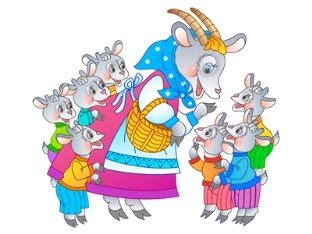 Storyteller: Dear children! Hope you like fairy-tales very much! You know an old story about the wolf and 7 little kids, don’t you? Now the play begins! Once upon a time there lived Mother Goat and her 7 little kids.
Storyteller: Dear children! Hope you like fairy-tales very much! You know an old story about the wolf and 7 little kids, don’t you? Now the play begins! Once upon a time there lived Mother Goat and her 7 little kids.
( Mother Goat has a milk can in her hand. She wants to go to the market.
Her kids are around her.)
Mother Goat: Now, my dear children, I must go to the market and get some milk for you. You must stay at home! You must not let anybody in. Lock the door! Goodbye!
7 Little Kids: Goodbye! Goodbye! Come back soon!
(They sing a song “1 and 2 and 3 and 4….”)
1 and 2 and 3 and 4 We are playing with the hands
We are dancing on the floor Look at our smiling face
We are dancing on the floor Look at our smiling face
Clap, clap, clap, clap. Clap, clap, clap, clap.
Storyteller: Look! There is a big bad wolf! He is at the door! He wants to eat up the kids!
Wolf (loudly and roughly): Open the door! It's me, your mother! I have some milk for you!
1st kid: No, no, you are not our mother!
2nd kid: Our mother's voice is soft!
3rd kid: Our mother's voice is sweet!
4th kid: We must not open the door to anybody!
Wolf (loudly and roughly): You are silly kids!( The wolf goes away.)
Storyteller: And the wolf changes his voice. Now his voice is soft and he goes to the Goat's house again.
Wolf (softly): Open the door, my dear children. It's me, your mother! I have some sweets for you!
5th kid: No, no, you are not our mother!
6th kid: Your voice is soft, but it is not our mother's!
Wolf: But don’t you want these nice sweets?
7th kid: We don’t want any sweets from you.
Wolf: And I have a cake for you!
1st kid: No, we don’t want a cake from you!
Wolf: And I have some ice-cream for you!
2nd kid: We don’t want any ice-cream from you!
Wolf: Open the door or I shall break it!
3rd kid: We are not afraid of you, a big bad wolf!
( The Wolf goes away. Kids sing a song.)
7 Little Kids: We aren’t afraid of a big bad wolf,
Big bad wolf, big bad wolf!
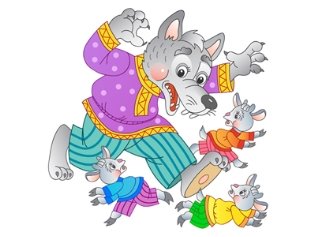 We aren’t afraid of a big bad wolf!
We aren’t afraid of a big bad wolf!
Tra-la-la-la-la!
Storyteller: The wolf is looking for a very big stick. He wants to break the door!
4th kid: We aren’t afraid of a big bad wolf! But we must fight against him if he comes back.
5th kid: You and you two take big spoons. You and you two take the frying-pans.
Storyteller: Do you hear the noise? That is a wolf again.
Wolf: Do you give up! One!
7 Little Kids: No!
Wolf: Do you give up! Two!
7 Little Kids: No! No!
Wolf: Do you give up! Three!
( Kids make awful noise, the Wolf is frightened.)
Oh! What is that? What is that? I must run away very quickly!
( Mother Goat come in.)
Mother Goat: Oh, what's the matter? What does this all mean?
6th kid: Everything is all right, mother!
7th kid: The wolf wanted to eat us up!
1st kid: But it is not so easy to do it!
Mother Goat: Oh, my dear brave children! It is very good that you are not afraid of a big bad wolf! There are many wolves in the world! If we fight all together, we shall win!
Storyteller: So, our fairy-tale is coming to the end. We are going to sing a song for you about friends!
A song “If you travel with your friends”(мотив мелодії «Если с другом…»)
If you travel with your friends,
If you travel with your friends
You enjoy the journey.
With the merry friends of mine,
With the merry friends of mine
I am happier and stronger!
When it rains or when it snows,
When it's sunny or wind blows
All my dear friends with me!
When it rains or when it snows,
When it's sunny or wind blows
All my dear friends with me!
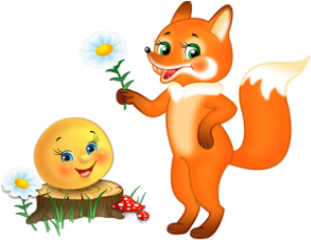
LITTLE ROUND BUN
Characters:
Grandpa,
Grandma,
Little Round Bun,
Hare, Bear,
Wolf,
Fox,
Author.
Author. Once upon a time there lived an old man and an old woman who
had nothing left to eat in the house, not even bread.
Said the grandpa:
Grandpa. Grandma, dear, bake a tasty bun, please.
Grandma. With great pleasure. Now I'll bake a little round bun. Here it
is. Look!
Grandpa. I like it. It is very nice, round and little. I think it is very tasty.
Grandma. You are right. But it is too hot now.
Grandpa. Put it on the window.
Grandma. OK.
Author. But the bun jumped out of the window and onto the bench outside,
and from the bench onto the ground, and away it rolled along the road!
Little Round Bun.
I'm Little Round Bun
I can sing and roll, and run,
I run away from home,
I'm here all alone.
Author. On and on it rolled, and it saw a Hare coming toward it.
Hare. Hello. I'm Hare-Long Ears. And who are you?
Little Round Bun. I'm Little Round Bun.
Glad to meet you.
Glad to meet you to. Oh, you are very nice. I'll eat you up.
Little Round Bun. Don't eat me! Don't eat me! I can sing and I'll sing
to you. Listen:
I'm Little Round Bun
I can sing and roll, and run,
I ran away from home,
I'm here all alone.
Author. And off it rolled and run away. By and by it saw a wolf.
Wolf. Hi! I'm Grey Angry Wolf. I'm very serious, and you?
Little Round Bun. I'm Little Round Bun. I'm happy.
І can sing and roll, and run,
I ran away from home,
I'm here all alone.
Author. And away it rolled. By and by it met a Bear coming toward it.
Bear. Hey, who are you?
Little Round Bun. I'm Little Round Bun. Glad to meet you. And who are you?
at you up.
Little Round Bun. No, you can't. I'll sing a song to you.
Listen:
I'm Little Round Bun
I can sing and roll, and run,
I run away from home,
I'm here all alone.
Author. And off it rolled and run away! By and by it saw a Fox.
Fox. Oh, what a nice
Little Round Bun! I like you.
Little Round Bun! I like you.
Little Round Bun. Who are you?
Fox. I'm a fox, I'm a fox. I'm a beautiful fox. My name is Foxie-Loxie.
I have a long tail. I am smart. I am special!
Little Round Bun. Glad to meet you, Foxie-Loxre. I can sing:
Listen:
I'm Little Round Bun,
I can sing and roll, and run,
I run away from home,
I'm here all alone.
Fox. Dear Little Round Bun, I can't hear you. I can't hear you. Sing a
song again. Come to me nearer.
Little Round Bun. With pleasure:
I'm Little Round Bun,
I can sing and roll, and run,
I run away from home,
I'm here all alone.
Fox. Gulp!!!
Author. But before it could go on, the Fox opened her mouth and snap! —
She ate it up.

Незнайко. А давайте і мене навчимо чомусь корисному.
Дівчинка1. Я можу допомогти тобі з англійською!
Незнайко. А який бал у тебе з іноземної?
Дівчинка1. Десять.
(виходить інша дівчинка)
Дівчинка2. А чого це ти будеш допомагати? Я теж можу!
Незнайко. А в тебе які оцінки?
Дівчинка2. Шість, а що ? Зате всі хіти англійською я знаю на зубок!(наспівує приспів «Freaky Like Me” Madcon)
Незнайко. Така англійська мені більше до вподоби. (підходить до Дівчинки2)
Дівчинка1. Почекай, почекай! (відтягує Незнайка за руку до себе) Але в цьому році я планую підвищити свій бал з іноземної до дванадцяти! А потім!... Університет, навчання за кордоном, Шекспір в оригіналі… Буду подорожувати: Канада, Америка, Австралія, Лондон… Може навіть до самої королеви потраплю на прийом…
Дівчинка2. (перериваючи) А я щоб вивчити англійську купила собі плеєр! (ставить плеєр на підлогу, звучить музика «Mistletoe” Дж. Бибера).
Незнайко. Аліно (Дівчинка2), твій метод вивчення англійської мені подобається! (Дівчинка1, махнувши рукою йде зі сцени) Слухай, а що воно означає “freaky like me”?
Дівчинка2. А я звідки знаю? Ти що хочеш, щоб я не лише знала слова пісень, а ще й розуміла що воно означають!?? Спитай краще в Ріти (Дівчинка1), це ж вона зібралася на прийом до королеви. А я!? Я – майбутня королева дискотеки! (йде наспівуючи)
Мова. Незнайку, чи сподобалося тобі сьогодні?
Незнайко. Дуже, дуже!
Мова. Незнайку діти багато працювали, щоб приготувати таке свято. І не лише сьогодні, а щодень, щоуроку… Тому я думаю , що тобі треба подякувати дітям і пообіцяти, що ти будеш старанно вчитися.
Незнайко. Обіцяю. І ви, діти, пообіцяйте, що будете старанно вчитися!
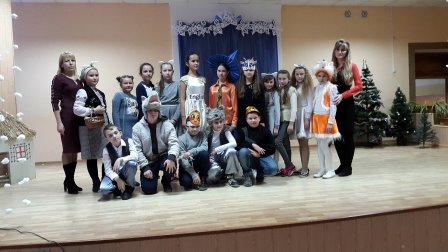
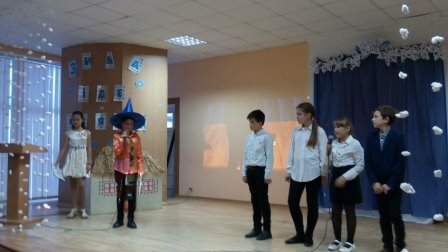
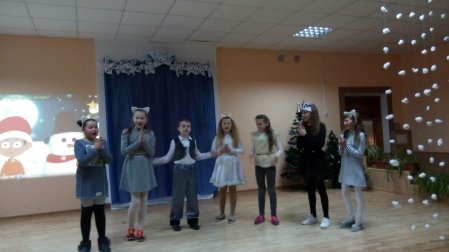
П’ятниця
- Інтелектуальне шоу «Who is the best at English?» (7 класи)
- Сценарій вечора «The Great Unknown», присвяченого творчості У. Шекспіра
- Підбиття підсумків.
«Who is the best at English?»
(A Contest for Pupils of Forms 6-7).

Мета:
- Показати, що учні засвоїли з англійської мови за час навчання.
- Розвивати мовленнєві здібності та вміння працювати в команді.
- Сприяти переходу лексики з пасивного запасу до активного.
- Розвивати пізнавальний інтерес учнів.
- Формувати культуру спілкування.
- Виховувати почуття самостійності та вміння долати труднощі.
- Виховувати інтерес та любов до вивчення англійської мови.
Хід заходу
T: Dear pupils and guests! I’m very glad to see you. Welcome to our contest for young experts of the English language. Our contest is called «Who is the best at English?».
I hope you’ll enjoy it. Let’s start.
Quizmaster: Two teams are welcome to our contest. But first, let me introduce our jury.
They are the pupils of the 10th form:
1)___________________________________
2)___________________________________
3)___________________________________
They will judge today’s contest. They’ll give 1 point for each correct answer. We are very glad to see you.
And now I want to introduce you our participants. The first team is called “Pussy Cats” and the second – “Teddy Bears”.
The teams, please, introduce yourselves.
Team 1. Hi, everybody! “We are Pussy Cats”. We are very glad to see you and to take part in today’s contest.
My Cat Pit
I have a cat, Each day I bring her And on my knee
Her name is Pit; A dish of milk, She likes to sit.
And by the fire And smooth her coat For pit loves me,
She likes to sit. That shines like silk. And I love Pit.
Team 2. Hi, everybody! We are “Teddy Bears” and we are together to take part in the contest.
My Teddy
My Teddy’s fur is soft and brown,
His legs are short and fat;
He walks with me all round the town
And never wears a hat.
My Teddy keeps me warm in bed,
I like his furry toes;
I like his darling little head,
His pretty little nose.
Quizmaster: So let’s start. There are 13 rounds in our contest.
Round 1. Who knows English alphabet better? You have to name the missing letters.
Round 2. Reciting competition.
I met a little girl
English is wonderful, Who came from another land.
English is great. I couldn’t speak her language
We can travel to England But I took her by the hand.
By plane or by train We danced together,
We should speak it well Had such fun.
To make many friends Dancing is a language
You can speak with anyone.
Round 3. What is there in my bag?
Представники команд отримують аркуш паперу, ручку і за 3-4 хвилини повинні згадати і записати, що знаходиться у їхньому портфелі.
Round 4. Who knows Great Britain better? A quiz.
1. What is the capital of GB?
2. On what river does London stand?
3. Name the main districts of London.
4. Name 4 places of interest in London.
5. How many floors has a typical English house?
6. What parts does GB consist of?
7. How is the flag of the UK called?
8. What is the population of GB?
9. Who is the head of the state?
10. What holiday is celebrated on the 25th of December?
11. What holiday is celebrated on the 14th of February?
- What holiday is celebrated on the 26to of December?
- What holiday is celebrated on the 31st of October?
- What are the most popular British sports?
- What is the colour of London buses?
- What is the colour of London taxi?
- In what countries is English spoken?
- What’s the weather like in winter in GB?
- What do the English people take when they go out into the street?
- Who built St. Paul’s Cathedral.
Round 5. Who knows the words best?
Team 1. “School”, “Flat”. Team 2. “Family”, “Holidays”.
The task is to write as much words on the topics as possible.
Round 6. Guessing riddles. Listen and guess.
I know everything, I teach everybody. But to make friends with me you must first learn to read. (A book)
- You keep me in your schoolbag, and I show how you learn your lessons.
(A daybook)
- I am used to draw lines with,
I am long and white and thin;
On my face black figures shine,
Try, you must my name define. (A ruler)
4. It is blue, and green, and yellow.
It shows rivers, deep not shallow,
Cities, mountains, lakes and seas-
All are there for him who sees. (A map)
5. My face is black, as black as night.
On I,t with chalk, all people write. (A blackboard)
6. This is a house with one window in it,
Showing films nearly every minute. (A TV set)
Round 6. Fill in the blanks with the correct words.
- Kyiv is to Ukraine as … is to Great Britain.
- Black is to white as hot is to … .
- Boy is to man as … is to woman.
- A page is to a book as a room is to a … .
- March is to May as September is to … .
- Doctor is to hospital as … is to school.
- Listen is to radio as … is to television.
- The Dnipro is to Kyiv as … is to London.
Keys: 1) London; 2) cold; 3) girl; 4) house; 5) November; 6) teacher; 7) watch; 8) the Thames.
Round 7. Relaxation.
(Учасники по черзі витягують листочок і виконують завдання, написане на ньому)
Show that you are: 1.Flying; 2.Running; 3.Playing volleyball; 4.Thinking; 5.Having lunch; 6.Smiling; 7.Getting up; 8.Singing; 9.Dancing; 10.Jumping; 11.Sleeping; 12.Swimming; 13.Playing the guitar; 14.Playing the piano; 15.Washing; 16.Brushing your teeth; 17. Playing snowballs; 18. Listening to the teacher.
Round 8. Find as many words as you can. Mind all words are adjectives.
E G J P V S M A L L
F Y O U N G Z T W B
A P W Z Y X C O L D
T H I C K J F D S I
J F Q C T L ON G
L A Z Y V G W J B D
G B I G S F R C T
H K V S A D P T J F
G C J G F V T A L L
B H A P P Y C G H K
Round 9. Read the words from every line. Take the first letter from the first word, the second –from the second, the third – from the third, the fourth - from the fourth. Read the word.
Garden, bird, fire, ball – (girl)
Letter, sad, camel, soup – (lamp)
Dog, bed, listen, bank – (desk)
Tall, dog, down, tennis - (town)
Round 10. Name the odd word. Для кожного учасника звучить 4 слова, серед яких він повинен назвати зайве.
- Spring, winter, January, summer.
- Red, blue, big, pink.
- Ukraine, USA, President, Great Britain.
- Desk, chair, table, room.
- Juice, tea, milk, salad.
- Sunday, Wednesday, October, Saturday.
- Where, when, to, who, what.
- English, Ukrainian, Italy, French.
- April, May, Sunday, December.
- Mother, father, teacher, sister.
Round 11. Unscramble these words.
- otnw; 2. mafily; 3. pyhpa; 4.ihar; 5. ady; 6. bohyb. (town, family, happy, hair, day, hobby).
Round 12. Listen to the text and draw a toy-house.
A Toy-House
Little Nelly is a doll. She lives in a pretty toy-house. There are three rooms in the toy-house: a bedroom, a dining-room and a kitchen.
The kitchen is very small. There is a gas-stove, a little table and a stool in the kitchen. There are many dishes, pots and pans on the shelves.
Nelly has her meals in the dining-room. The dining-room is very big. We see a round table, many chairs, a cupboard, a sofa and a piano in the dining-room. We can see many pictures on the walls.
Nelly sleeps in her bedroom. There is a bed, a wardrobe, a little table, an arm-chair and a mirror in the bedroom. We see a pretty vase and a lamp on the table.
Round 13. “The Captains’ Competition”
T: Captains, introduce yourselves!
- Hi! My name is … . I’m 10. I’m a pupil of form 6-B.I have got a mother, a father, a grandmother, a grandfather. We are Ukrainians. My family is very friendly. I like to go to school and to study. My favourite lessons are English, Maths and Physical Training. My hobby is playing computer games, football and reading books. I’ve got many friends.
2. Questions to the captains:
- How do we call a very big town?
- What is the friendliest cat’s name?
- Where did Carlson live?
- What kind of transport does Baba Yaga use?
- Summer goes after …
- Your mother’s husband.
- Your father’s brother.
- They can fly.
- They can swim.
- A daughter of the queen.
3. Choose the correct word to complete the sentence.
- Bill lives in the USA. He is … .
- British; b) Canadian; c) American.
- She is 38, she is married. She is … Smith.
- Ms; b) Mrs; c) Miss.
- Your father works at the shop. He is a … .
- shop assistant; b) secretary; c) sailor.
- We usually jump and run at the … lessons.
a)Sport; b) Literature; c) Handicraft.
Quizmaster: And now it’s time for the jury to sum up the results of our contest.
T: I hope you have enjoyed the English party. Thank you very much for taking an active part in our contest. Best wishes to you. Good-bye. 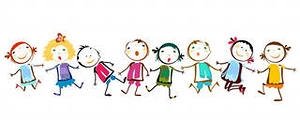
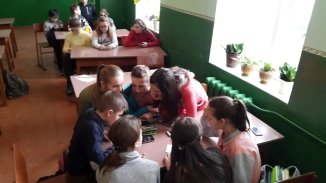
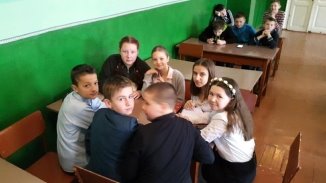
Сценарій вечора «The Great Unknown», присвяченого творчості У. Шекспіра
( 10-11 класи)
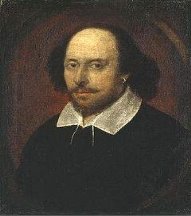
Мета заходу: познайомитися з життям і творчістю великого поета, деякими його сонетами в оригіналі і перекладах Маршака, Фінкеля, Пастернака.
Завдання: практика учнів у монологічної мови, тренування умінь виразного читання сонетів, розвиток комунікативної компетенції, виховання любові до літератури країни мови, що вивчається, розвиток естетичного смаку.
Обладнання:
- слайди: портрет У. Шекспіра; види р. Стретфорда-на-Ейвоні; театр «Глобус» (сучасна будівля і часів Шекспіра); малюнки учнів за сюжетами творів У. Шекспіра;
- лютневая музика 15 - 16 століття;
- музична запис А. Пугачової «Сонет»;
- плакати з цитатами з творів У. Шекспіра.
Хід вечора:
(звучить лютневая музика 15 - 16 ст. Н. Нигвино - Ричеркар)
Compere: Hello everyone! The last half of the 16 and the beginning of the 17 centuries are known as the Golden Age of English literature. It was the time of the English Renaissance and it is even called" The Age of Shakespeare". (на екран проектується портрет У. Шекспіра.)
Our party is dedicated to the greatest and the most famous of English writers and probably, the greatest playwright who has ever lived, William Shakespeare. We are going to recite some of his wonderful sonnets and get acquainted with their Ukrainian translations by Marshak, Pasternak, Finkel.
Pupil 1:
Sonnet 91
Some glory in their birth, some in their skill,
Some in their wealth, some bodies in their' force;
Some in their garments, though new - fangled ill;
Some in their hawks and hounds, some in their horse;
And every humour hath his adjunct pleasure
Wherein it finds a joy above the rest.
But these particulars are not my measure;
All these I better in one general best.
Thy love is better than high birth to me,
Richer than wealth, prouder than garments' cost,
Of more delight than hawks or horses be,
And having thee, of all men's pride I boast;
Wretched alone in this, that thou mayst take
All this away, and me most wretched make.
Pupil 2: And i'd like to recite the translation of the sonnet by Marshak:
Хто хвалиться своїм спорідненням зі знаттю,
Хто силою, хто блискучим галуном,
Хто гаманцем, хто пряжками на сукню,
Хто соколом, собакою, скакуном.
Є у людей різні пристрастья,
Але кожному наймиліші одне.
А у мене особливе щастя-
У ньому все інше укладено.
Твоя любов, мій друг, дорожче скарбу,
Почесніше корони королів,
Нарядно багатого вбрання,
Соколиного полювання веселіше.
Ти можеш все відняти, чим я володію,
І в цю мить я відразу збіднію.
Pupil 3: I say, would you like to listen to my own version of this sonnet?
Compere: Why not?
Pupil 3:
Хто славиться своїм знатнейшим родом,
Руками, силою, багатством,
Хто тряпкою своєї з коштовних шиттям,
Своєю худобою, собаками, орлами.
У кожного сеньйора є своє,
Чим міг би він пишатися, захоплюватися.
Але для мене все це лише безглузде хвилювання,
Яке не коштує і гроша.
Твоя любов замінить мені все це
І буде восхищеньем для мене.
Навіщо багатство мені, одяг, коні?
Нащо мені життя, коли немає в ній тебе?
З твоєю любов'ю душа житиме вічно,
А якщо тебе немає, то немає, на жаль, душі.
Compere: Not bad, indeed! Well, to continue.
In spite of shakespeare's fame, we know very little about his life because he didn't write any diaries and спогади. But it's true to fact that he was born on the 23 of April, 1564 in Stratford - on - Avon, a small town in the centre of Great Britain. (на екран проектуються види р. Стретфорда-на-Ейвоні)
In his childhood William went to the local Grammar School, where besides reading and writing he was taught Latin and Greek.
Pupil 4: i'd like to add that at that time there were no theatres in England. Groups of actors travelled from town to town and played in different places, usually out - of - doors. Sometimes actors came to Stratford. Young William went to see all their shows and liked them very much. He wanted to become an actor. Sometimes he wrote little plays himself and staged them with his friends. At the age of 18 William married Anna Hathaway, who was 9 years older than her husband. Their first daughter was born in 1583. And then twins - a son and a daughter followed in 1585.
Pupil 5: By the way, I know that W. Shakespeare lived in Stratford until he was about 21. Then he left for London. I wonder why he left his native town.
Pupil 4: It is unknown. Probably life in Stratford was hard and he wanted to earn some money?
Pupil 5: Maybe. In London William joined a group of actors. The famous Globe Theatre was the centre of
London's theatrical life. (на екран проектуються види театру «Глобус»). Shakespeare played on stage and its wrote plays for this theatre. Would you like to listen about the theatre of the century 16?
Pupils: Yes, certainly.
Pupil 5: Well, in the middle of the square there was a kind of a house. There the actors dressed kept and the things used in the performance. In front of it there was a platform on which the actors played. They came out of the house to the stage through large two doors. In front of the stage there was a large yard balconies with three round it. People came here to see performances. The yard and the greater part of the stage were to open the sky.
Compere: Sorry, do you happen to know that women's parts were played by boys or young men?
Pupil 5: Yes indeed. It's just that I was going to say. Besides, an actor played 2 or 3 parts in one performance.
Pupil 6: The actors were very often good. They could play, sing and dance. The performance began at 3 o' clock. Londoners loved their theatre very much. It is interesting to know that everybody went to the theatre in London - both young and old, rich and poor. Poor people stood in the yard or sat on the ground. The rich sat in the balconies and the aristocrats were allowed to sit on the stage.
Pupil 7: How interesting!
Pupil 8:
Sonnet 90
Then hate me when thou wilt; if ever, now;
Now, while the world is bent my deeds to cross,
Join with the spite of fortune, make me bow,
And do not drop in for an after - loss:
Ah, do not, when my heart hath 'scaped this sorrow,
Come in the rearward of a conquer'd woe;
Not Give a windy night a rainy morrow,
To linger out a purposed overthrow.
If thou wilt leave me do not leave me last,
When other pretty griefs have done their spite,
But in the onset come; so shall I taste
At first the very worst of fortune's might,
And other strains of woe, which now seem woe,
Compared with loss of thee will not seem so.
(звучить пісня « Сонет» у виконанні А. Пугачової, переклад С. Маршака)
Якщо ти розлюбиш - так тепер,
Тепер, коли весь світ зі мною в розбраті.
Будь самої гіркою з моїх втрат,
Але тільки не останньою краплею горя!
І якщо скорботу дано мені перемогти,
Не наноси удару із засідки.
Нехай бурхлива не вирішиться ніч
Дощовим ранком - вранці без відради.
Залиш мене, але не в останню мить,
Коли від дрібних бід я ослабею.
Облиш зараз, щоб відразу я зрозумів,
Що це горе всіх негараздів болючіше,
Немає проблем, а є одна біда-
Твоєї любові втратити назавжди.
Compere: And one more thing about the theatre: it played a very important part in people's lives as there were no newspapers, no or radio television in those days. They came to the theatre not only for pleasure, they came to hear the news, to learn something of the history of England or of some other country. They were taught the great science of life there.
Pupil 7: As you know, W. Shakespeare was an actor, a poet and a dramatist at the same time. All in all, he wrote 37 plays, 2 poems and 154 sonnets where he showed his creative genius.
Сонет 130: (в якості фону тихо звучить лютневая музика «Спандольетта»)
My mistress' eyes are nothing like the sun;
Coral is far more red than her lips' red;
If snow be white, why then her breasts are dun;
If hairs be wires, black wires grow on her head.
I have seen roses damask'd, red and white,
But no such roses I see in her cheeks;
And in some perfumes there is more delight
Than in the breath that from my mistress reeks.
I love to hear her speak, yet well I know
That music hath a far more pleasing sound;
I grant I never saw a goddess go;
My mistress, when she walks, treads on the ground.
And yet, by heaven, I think my love as rare
As any she belied with compare false.
Pupil 9:
The translation of the sonnet by S. Marshak:
Її очі на зірки не схожі,
Не можна уста коралами назвати,
Не білосніжна плечей відкритих шкіра,
І чорною стрічкою в'ється пасмо.
З дамаської трояндою, червоної або білої,
Не можна порівняти відтінок цих щік.
А тіло пахне так, як пахне тіло,
Не як фіалки ніжною пелюстка.
Ти не знайдеш у ній досконалих ліній,
Особливого світла на чолі.
Не знаю я, як крокують богині,
Але мила ступає по землі.
І все ж вона поступиться тим навряд чи,
Кого в сравненьях пишних оббрехали.
Pupil 6:
Now listen to the translation of the sonnet by A. Finkel: ( фонова музика - сюїта для лютні Ст. Галілеї)
Її очі не схожі з сонцем, немає;
Корал красно цих червоних губ;
Темніше снігу смаглявий колір шкіри;
Як дріт, чорний грубий волос;
Візерункових троянд в садах не перелічити,
Але їх не видно на щоках у неї,
І в світі багато ароматів є,
Її подих солодше і сильніше.
В її промовах відраду знаходжу,
Хоч музика приємніше на слух;
Як крокують богині, не скажу,
Але ходить по землі, як всі, мій друг.
І я клянусь - вона не гірше все ж,
Ніж ті, кого в сравненьях славить брехня.
Compere: Which variant did you like more?
Pupil 10: I feel both are superb.
The first period (1590 - 1600) of shakespeare's creative work consists of comedies and historical dramas. In this period he wrote such histories as "King Henry the IV", "King Henry the V", "King Richard the II", "King Richard the III" etc. Here the author showed historical events and dramatic characters. Speaking about his famous tragedies, I can say that they appeared in the second period of his literary work between 1600 and 1608. In the plays of this time, the dramatist reaches his full maturity. These are "Hamlet", "King Lear", " Macbeth", " Othello". "Romeo and Juliet", I think, is one of his best plays. It's a tragedy but it is full of love, youth and humanism.
Compere: How you are right! It is my favourite play, too. I was greatly impressed when reading it for the first time. Well, then. The dramatist's plays of the third period (1609 - 1611) are called Romantic Dramas. They are "The Tempest", "The winter's Tale" etc. In 1612 Shakespeare left London for Stratford. He didn't act any more. Since 1613 he no longer wrote plays. Nobody knows what he did during the last years of his life. Eventually, he died on the 23 of April 1616. It's incredible but true that he died on his birthday at the age of 52.
Pupil 4: (фон - англійська народна лютневая музика 16 ст.)
Сонет 66:
Tired with all these, for restful death I cry;
As to behold desert a beggar born,
And needy nothing trimm'd in jollity,
And purest faith unhappily forsworn,
And gilded honour shamefully misplaced,
And maiden virtue rudely strumpeted,
And right perfection wrongfully disgraced,
And strength by limping sway disabled,
And art made tongue - tied by authority,
And folly doctor - like controlling skill,
And simple truth miscall'd simplicity,
And captive good відвідують captain ill:
Tired with all these, from these would I be gone,
Save that, to die, I leave my love alone.
Pupil 5:
The translation of the sonnet by B. Pasternak:
Намучившись всім, я хочу померти.
Туга дивитися, як мається бідняк,
І як жартома живеться багатієві,
І довіряти і потрапляти в халепу,
І спостерігати, як нахабство лізе в світ,
І честь дівоча котиться до дна,
І знати, що ходу совершенствам немає,
І бачити міць у немочі в полоні,
І згадувати, що думки замкнутий рот,
І розум зносить дурниці хулу,
І прямодушье простотою має славу,
І доброта прислуговує злу.
Намучившись всім, не став би жити і дня,
Та одного важко буде без мене.
Compere: It must be admitted that British people are very proud of their great poet and call him" Our National Bard", "The Immortal Poet of Nature", "The Swan of Avon", "The Great Unknown". Крім того, W. Shakespeare is beloved by Ukrainian people. His plays are staged in our theatres as well as all over the world and are always a great success with the public.
(розігрується сценка з трагедії Шекспіра «Король Лір»)
King Lear: My dear daughters, i'm very old and tired. I can't be the King of Britain any more. I want to divide the country into three parts and give one part to each of you. And you'll be the queens of your parts. But first you must tell me how much you love me. Then I will know of which you must get the better part.
Goneril: Dear father, I love you very much. I love you more than my beauty, more than my life. No child loves his father more than I do.
Regan: If only you knew what you mean for me. You are the dearest man in my life. I can't imagine myself without you.
King Lear: i'm very glad to hear that. And what would you like to tell me, Cordelia?
Cordelia: I don't understand why my sisters say they love you more than anything else. They are married. Don't they love their husbands? You are my father, and of course, I love you. But when I marry i'll love my husband, too.
King Lear: Oh, it's not the right thing you've told me! I'm disappointed. I don't want to have such a daughter! You'll get nothing! Go away!
Compere: Well, dear guests! Have you recognized the play? Certainly, it's "King Lear".
And now let's read and translate some famous quotations and interesting expressions from shakespeare's plays (the task for the pupils, the posters are on the walls of the classroom):
-The beginning of the end - Початок кінця.
-All is well that ends well - Все добре, що добре закінчується.
Life is not all cakes and ale - Життя прожити - не поле перейти.
Much ado about nothing - Багато шуму з нічого.
Sweets to the sweet - Прекрасне - прекрасною.
Brevity is the soul of wit - Стислість - сестра таланту.
To win golden opinions - Заслужити сприятлива думка.
The wrilling of time - Мінливості долі.
Compere: All right. And now I suggest our guests work a little bit. Please match the beginnings with the endings of some shakespeare's plays, translate them into Ukrainian and say if they are comedies or tragedies. (на екран проектується завдання)
The beginnings:
-A Midsummer
-Anthony and
-The Taming
-The Comedy
-Hamlet
-The Merry Wives
-Julius
The endings:
-Caesar
-Of Windsor
-Prince of Denmark
-Of the Shrew
-Night's Dream
-Cleopatra
-Of Errors
Compere: Are you ready? Let's check up the answers:
-"A Midsummer night's Dream", a comedy -"Сон в літню ніч"
-"Anthony and Cleopatra", a tragedy -"Антоній і Клеопатра"
-"The Comedy of Errors", a comedy - "Комедія помилок"
-"The Taming of the Shrew", a comedy -"Приборкання норовливої"
-"Hamlet, Prince of Denmark", a tragedy -"Гамлет, Принц Датський"
-"The Merry Wives of Windsor", a comedy -"Віндзорські пустунки"
-"Julius Caesar", a tragedy -"Юлій Цезар"
Compere: (звучить сюїта для лютні Франческо да Мілано)
All is well that ends well. Our party is coming to an end. I hope you do enjoyed it. Thank you so much for your attention. Enjoy reading Shakespeare!
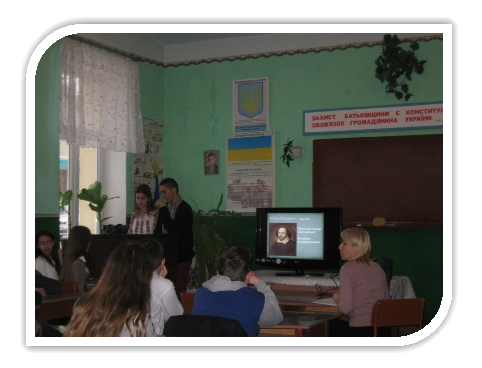

про публікацію авторської розробки
Додати розробку

-
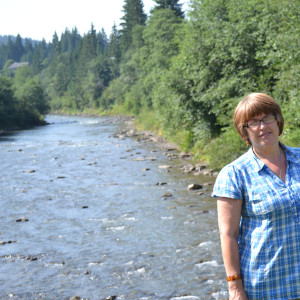
Малунова Олена Андріївна
08.02.2023 в 11:03
Дуже цікава розробка, оригінальна. Дякую.
Загальна:
5.0
Структурованість
5.0
Оригінальність викладу
5.0
Відповідність темі
5.0
-

Orlova Olena
06.02.2022 в 19:16
Дякую. Чудова розробка
Загальна:
5.0
Структурованість
5.0
Оригінальність викладу
5.0
Відповідність темі
5.0
-

Павлюк Віра
03.02.2022 в 17:51
Дуже вдячна. Проведена велика робота щодо підбору матеріалу. Є що вибрати кожному. Ціную вашу працю!
Загальна:
5.0
Структурованість
5.0
Оригінальність викладу
5.0
Відповідність темі
5.0
-

дильдіна марія в'ячеславівна
07.02.2021 в 16:44
план шикарний. безмежно вдячна!
Загальна:
5.0
Структурованість
5.0
Оригінальність викладу
5.0
Відповідність темі
5.0
-

Солопова Наталія Юріївна
29.10.2020 в 20:28
Загальна:
4.7
Структурованість
5.0
Оригінальність викладу
4.0
Відповідність темі
5.0
-

Боженко Вероника
27.09.2020 в 17:29
Дуже дякую Вашому сайту за цікаві, різноманітні розробки уроків та позакласних заходів!
Загальна:
5.0
Структурованість
5.0
Оригінальність викладу
5.0
Відповідність темі
5.0
-

Посунько Катерина
19.02.2020 в 22:16
Дуже цікавий і гарно підібраний матеріал!!!!!!!
Загальна:
5.0
Структурованість
5.0
Оригінальність викладу
5.0
Відповідність темі
5.0
-

Глущик Ірина
03.01.2020 в 21:30
Загальна:
5.0
Структурованість
5.0
Оригінальність викладу
5.0
Відповідність темі
5.0
-

Цис Альона
31.10.2018 в 16:49
Дякую за чудовий матеріал!
Загальна:
5.0
Структурованість
5.0
Оригінальність викладу
5.0
Відповідність темі
5.0
Показати ще 6 відгуків